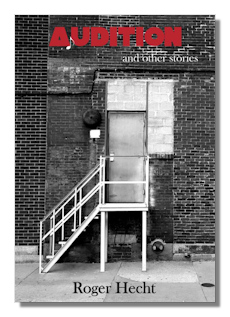
The Internet's Premier Classical Music Source
Related Links
-
Introduction
Acoustics
Ballet
Biographies
Chamber Music
Composers & Composition
Conducting
Criticism & Commentary
Discographies & CD Guides
Fiction
History
Humor
Illustrations & Photos
Instrumental
Lieder
Music Appreciation
Music Education
Music Industry
Music and the Mind
Opera
Orchestration
Reference Works
Scores
Thematic Indices
Theory & Analysis
Vocal Technique
Search Amazon
Recommended Links
Site News
 Book Review
Book Review
Audition and Other Stories

Roger Hecht
Redmond, Washington: English Hill Press, 2013, 247pp
ISBN-10: 0984654313
ISBN-13: 978-0984654314
Writers, including writers of fiction, generally write most convincingly about things they know well. Roger Hecht is a trombonist, chess player, cat lover, writer about classical music, husband, and reference librarian. Except for the last, an identity I have shared in my time, Hecht has managed to include in these stories knowledge by acquaintance of all these identities. One of his trombone players even published an article about Elgar, something Hecht has done also. This is not to say that these are autobiographical stories, even though some are written in the first person. Just well-informed stories. The one outlier is a rather horrific, and ultimately open-ended account of a young woman's experience of military occupation of her small mountain village in a fictional country. But there will be no spoilers in my accounts of these tales.
What I will say is that every one of these, from the initial seventy-five page novella which is the title story, to the very humane eight page final story called "Aunt Jessie," grabbed me from the outset and kept my interest to the end. All of them contained an element of suspense as to what would happen next. The final outcome was frequently a surprise. Several dealt expressly with music, even the brief final story containing the lines:
"'How can people afford music in such hard times?' Claire wanted to know."
"How can they afford not to have music, [Hugh] said."
The title story, which shares a title with the Metropolitan Opera's DVD about a group of national finalists, is clearly based on the author's extensive personal experience of auditioning for orchestral positions as a bass trombone player in major U.S. and Canadian orchestras, and describes the entire process from the position announcement, list of passages to be performed, the enormous amount of careful and analytical practicing, with some more or less technical details, the personal anxiety, the self-doubt, the competitiveness, the different personalities of the competitors, the stages of elimination, the final outcome and revelation of the forces and opinions involved in a close call.
"Meet Not Cute," the significance of the title probably obscure to anyone who has not seen the film The Holiday, with Kate Winslet, features a man and woman neither of whom exactly exemplify a sense of gracious tact – the scene of screaming accusation in the green room after a concert a prime instance – but who continue to interact against all odds and expectations.
"Dream Date," literally resulting from a series of dreams, concerns missed opportunity for two bullied sixteen year olds who meet again decades later and learn things about themselves.
Hecht has significant things to say about men and women, children and parents, winners and losers – persistent and otherwise.
Very much recommended.
Copyright © 2014, R. James Tobin


















